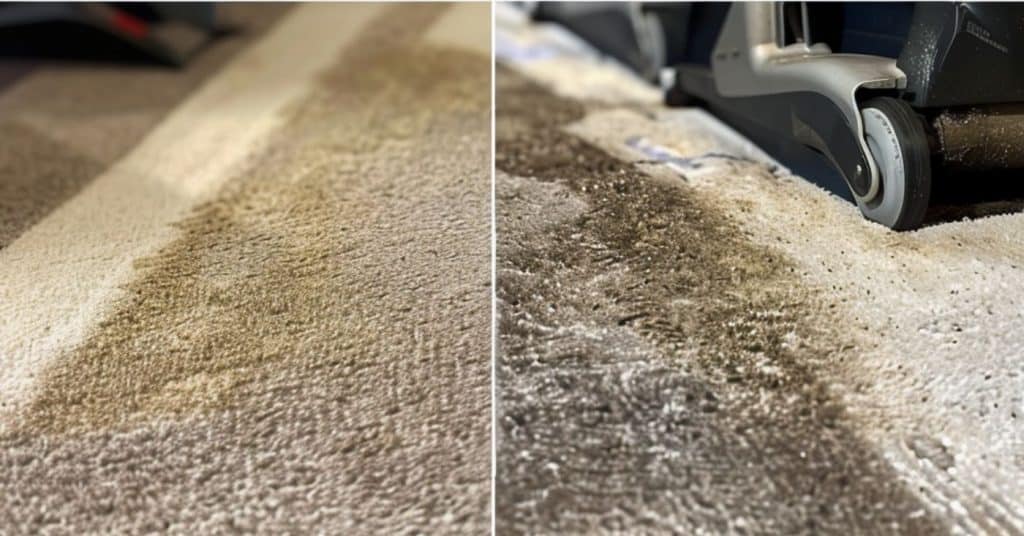We’ve all been there—investing time and effort into cleaning our carpets, expecting a fresh and inviting scent to fill the room, only to be met with an unexpected and unpleasant odor. It’s a common concern that puzzles many homeowners.
Why does this happen, and more importantly, is it normal? Understanding the reasons behind this phenomenon can offer peace of mind and, fortunately, we’re here to shed some light on the subject.
With our experience from providing Melbourne carpet steam cleaning services, we’ll explore the factors that contribute to that post-cleaning smell. From the type of cleaning method used to the nature of the stains, various elements play a role. But fear not, we’re not just here to diagnose the problem.
We’re also armed with solutions and preventative measures to ensure your carpets remain fresh and inviting, long after the cleaning process is over.
Why Does My Carpet Stink After Cleaning?
The Science of Carpet Smells
Ever wondered what’s behind that funky smell coming from your carpet after a good scrub? It’s all about the science. When carpets are cleaned, water and cleaning agents penetrate the fibers. If not properly dried, this creates a breeding ground for mold and bacteria, leading to musty odors.
Additionally, the water can reactivate dormant smells, such as pet urine or spilled milk, locked deep within the carpet’s fibers. Understanding this fact helps us target the root of the problem, ensuring fresh, clean-smelling carpets after every clean.
Types of Odors Common in Carpets
Carpet odors come in various, shall we say, “flavors.” Mustiness, a common complaint, usually signals lingering moisture or mold. Another frequent offender is the scent of pet accidents, which can penetrate deeply into carpet fibers and padding. Then there’s the sharp tang of chemical odors from cleaning solutions, especially if they’re not thoroughly rinsed out.
By identifying the type of smell, we can adopt the most effective cleaning and drying strategies, turning a potentially embarrassing situation into a victory for homeowners everywhere.
Factors That Influence Post-Cleaning Smells
Understanding why carpets smell after a thorough wash requires a look into various factors. From the time it takes your carpet to dry to the products used during cleaning, several elements play a critical role.
Let’s dive into the specifics.
Drying Time and Ventilation
One key player in the aftermath of carpet cleaning is how fast the carpet dries. Slow drying times can turn your carpet into a breeding ground for mold and mildew, leading to musty odors that nobody welcomes.
Ensuring proper ventilation helps accelerate drying and wards off these unwanted smells. Opening windows and using fans can significantly make a difference by ushering in fresh air and facilitating quicker drying times.
Cleaning Methods and Products
The cleaning approach and solutions used also determine the final smell of your carpet. For example, using too much water or choosing the wrong cleaning products can leave a lingering odor. Carpets cleaned with harsh chemicals may retain a strong scent that mimics the cleaning solution.
Conversely, eco-friendly and mild detergents are less likely to leave a persistent smell behind. It’s all about striking the right balance and recognizing what works best for your carpet’s fabric.
Carpet Material and Age
Lastly, the type of carpet and its age can influence how it smells post-cleaning. Older carpets, which have been subject to years of wear and tear, as well as accumulated debris, may well emit odors more readily after cleaning. This is due to the breakdown of fibers and the deep-seated grime that can release odors when disturbed.
Furthermore, natural fibers like wool can absorb more moisture than synthetic ones, potentially leading to a longer drying time and a higher chance of developing mildewy smells if not dried adequately.
By examining these factors, we gain insight into the nuanced interplay that governs the overall freshness of our carpets after cleaning. A bit of knowledge and attention to detail can go a long way in keeping those pesky odors at bay, leading to a cleaner, fresher smelling home.
What to Do If Carpet Smells After Cleaning?
Natural Remedies and Solutions
First, let’s tackle the issue with some home-based solutions that can make a big difference. Opening windows and ensuring good air circulation significantly speeds up the drying process and prevents the growth of mold—nature’s air purifier at work. Fans can also help move air around, cutting down on drying time.
Next, baking soda isn’t just for your fridge; it absorbs odors wonderfully. A liberal sprinkle on the carpet left overnight before vacuuming can work wonders for musty smells.
If the odor persists, a diluted white vinegar solution in a spray bottle can tackle more stubborn smells. Remember, patience is key; allow the carpet to dry fully after any treatment.
When to Call in the Professionals
Sometimes, despite our best efforts, the stink sticks. This is when it’s time to call in the cavalry.
Professional carpet cleaners have the tools and know-how to root out and eliminate odors that refuse to budge. They can also identify if the smell is a sign of a bigger issue, like mold or mildew deeply embedded within the carpet fibers or padding. Choosing a trusted, reputed service provider ensures your carpet gets the deep clean it needs without causing further damage.
Plus, they can offer advice on preventing future odor issues, keeping your carpets smelling fresh longer. Remember, investing in professional cleaning periodically also extends the life and beauty of your carpets, making it a smart long-term decision for your home.
Preventative Measures for Carpet Care
Taking care of carpets involves more than just dealing with odors after cleaning. By focusing on prevention, we can maintain the freshness and extend the life of our carpets.
Let’s dive into how selecting the right cleaning products and adhering to regular maintenance can make a world of difference.
Choosing the Right Cleaning Products
Picking the perfect cleaning solution doesn’t have to be a puzzle. It’s crucial to opt for products that are compatible with your carpet’s material. Carpets are like delicate fabrics; not everything can handle harsh chemicals.
We recommend using gentle, eco-friendly options that pack a punch without leaving harmful residues. Also, doing a spot test in an inconspicuous area saves you from a potential carpet catastrophe. Remember, what works wonders on one carpet may well wreak havoc on another. It’s all about finding that sweet spot between efficiency and gentleness.
Regular Maintenance and Best Practices
Consistency is key in carpet care. A simple yet effective routine involves vacuuming at least once a week to remove dirt and allergens. For high-traffic areas, consider bumping that up to twice or even thrice a week. Spills are inevitable, but how you handle them can make all the difference. Blotting—not rubbing—is the golden rule here, followed by using your trustworthy cleaning solution.
Additionally, embracing the habit of removing shoes at the door drastically reduces the amount of dirt introduced to your carpets. Lastly, arranging for a professional deep clean annually doesn’t just fight odors; it rejuvenates your carpet, keeping it looking and feeling its best. Regular, attentive care ensures your carpets remain a source of comfort, not concern.
See more:

